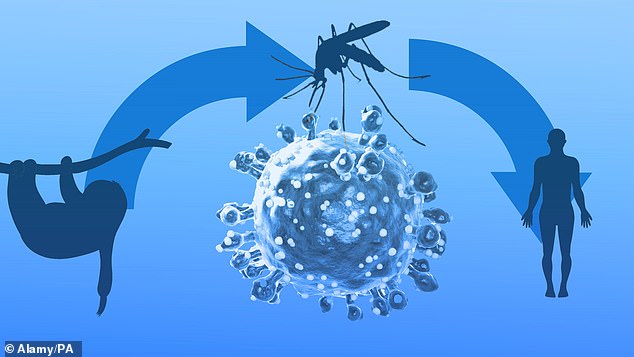Health chiefs have issued an urgent warning after three people in the UK were diagnosed with ‘sloth fever’—a tropical disease typically only found in Brazil.
The illness also known as the Oropouche virus (OROV), usually causes mild symptoms that disappear after less than a week.
Signs you may be infected include a fever, headache, joint pain, muscle aches, chills, nausea, vomiting, a rash, dizziness, sensitivity to light, and pain behind the eyes.
However, occasionally the virus can attack the brain leading to meningitis or encephalitis, which can prove fatal.
But fortunately, these neurological symptoms only occur in about 4 per cent of infected patients.
It is sometimes known as ‘sloth fever’ because it naturally occurs in sloths, as well as primates and birds.
New figures released yesterday by UKHSA revealed there have been three cases of the virus in Britain, but no deaths so far.
All three of the cases were in people who had returned to the UK after travelling abroad to Brazil.


Health chiefs issued the warning after three people were diagnosed with the virus in the UK

The oropouche virus is often passed to humans via mosquitoes and midgesthat have already fed from an infected animal
The lesser-known tropical infection is spread through bites from small midges and some mosquitos.
While it can also be sexually transmitted, there have been no reports of transmission through sexual activity to date.
There is no cure, with about 60 to 70 per cent of patients experiencing a recurrence of the disease a few days to months after the initial infection.
However, the symptoms can be managed by resting, drinking plenty of fluids, and taking paracetamol or other over-the counter medications.
There is no vaccine but there are preventative measures travellers can take like wearing long-sleeved clothing and using insect repellent to ward off midges.
These insect repellents need to be 50 per cent DEET—the active ingredient which repels pests like midges and mosquitos.
Other measures include staying in places with air conditioning or window screens with fine mesh to keep out midges and using insecticide-treated fine mesh bed nets.
The first reported deaths from the illness which has been around since the 1950s were two women in Brazil last year.
So far this year, globally, there have been over 12,000 confirmed cases of the virus, with the majority (11,888) in the country where the women died.
It has also spread to other areas of South America, as well as America and Canada who have both reported one case.
Since the start of the year there have sadly been five deaths which have also taken place in Brazil.
They have also reported neurological complications and foetal complications which are under investigation.
In their recent warning, officials urged caution to pregnant women travelling to Central and South America that the virus has been linked to miscarriages.
‘If you’re pregnant and considering travel to affected areas, it is important to discuss this with your GP or travel clinic before you go,’ said UKHSA.
‘While we are still learning about the risks of OROV during pregnancy, the potential for mother-to-child transmission—and impact on the foetus—means caution is necessary.’
Share or comment on this article:
Alert issued by health chiefs after oropouche virus is detected in three Britons, these are the warning signs of ‘sloth fever’